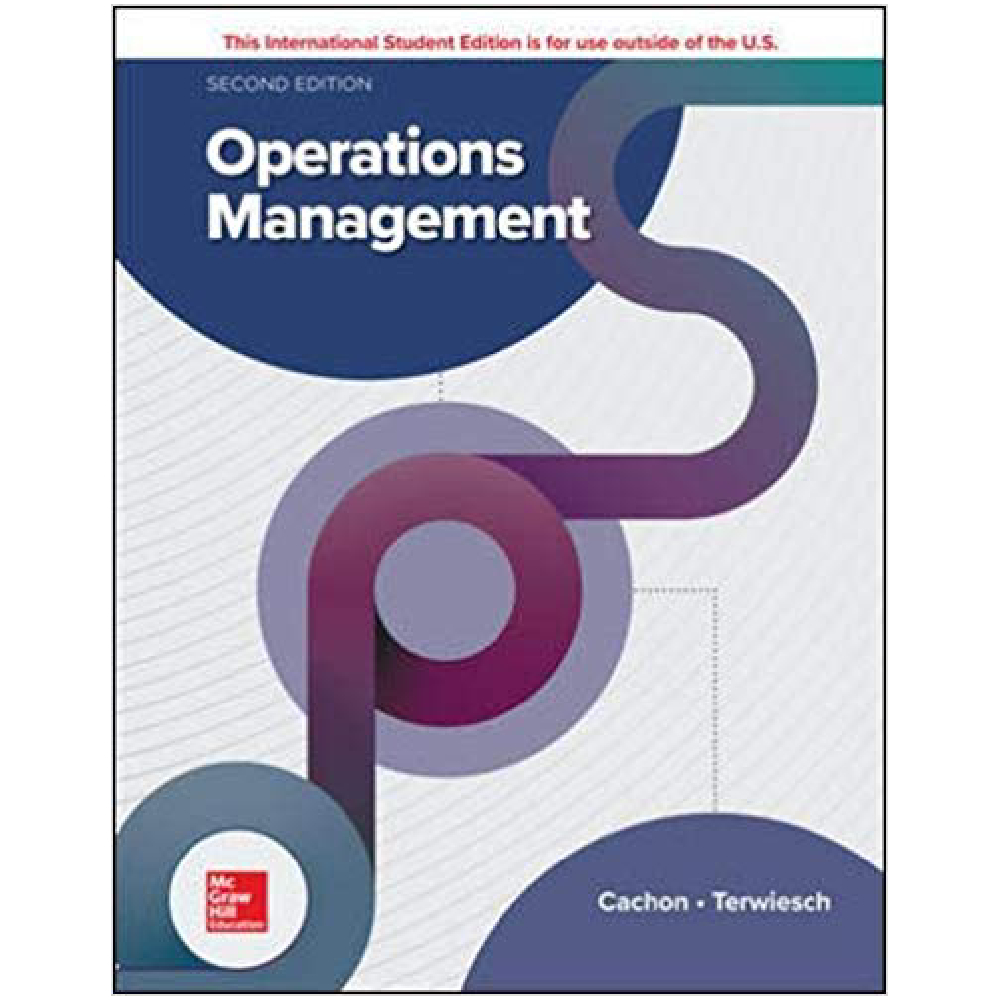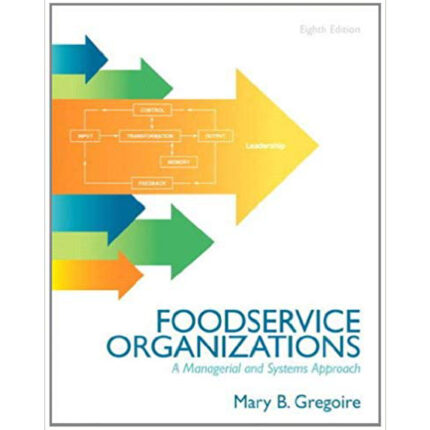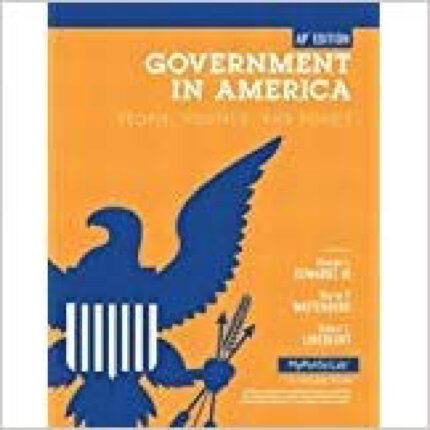Operations Management 2nd Edition By Gerard Cachon – Test Bank
Chapter 11 Supply Chain Management
1) A supply chain with a distributor has more product handling than one without a distributor.
Answer: TRUE
Explanation: A supply chain with a distributor has to do extra loading and unloading at the distribution center and therefore has more product handling than one without a distributor.
Difficulty: 2 Medium
Topic: Supply Chain Structure and Roles
Learning Objective: 11-01 Explain the roles and value of each layer within a supply chain.
Bloom’s: Understand
AACSB: Analytical Thinking
Accessibility: Keyboard Navigation; Screen Reader Compatible
2) Tier 2 suppliers are primary suppliers to manufacturers.
Answer: FALSE
Explanation: Tier 2 suppliers are primary suppliers to tier 1 suppliers.
Difficulty: 1 Easy
Topic: Supply Chain Structure and Roles
Learning Objective: 11-01 Explain the roles and value of each layer within a supply chain.
Bloom’s: Remember
AACSB: Analytical Thinking
Accessibility: Keyboard Navigation; Screen Reader Compatible
3) Inventory availability is a service metric to evaluate the performance of a supply chain.
Answer: TRUE
Explanation: Inventory availability measures the extent to which customers’ demands are satisfied. Therefore, it is a way to evaluate the performance of a supply chain from a service perspective.
Difficulty: 1 Easy
Topic: Metrics of Supply Chain Performance
Learning Objective: 11-02 Explain the metrics used to evaluate the performance of a supply chain.
Bloom’s: Remember
AACSB: Analytical Thinking
Accessibility: Keyboard Navigation; Screen Reader Compatible
4) Lead time is a way to measure the availability of inventory.
Answer: FALSE
Explanation: The lead time is the time between when an order is received and when it is delivered. It depends on the availability of inventory.
Difficulty: 2 Medium
Topic: Metrics of Supply Chain Performance
Learning Objective: 11-02 Explain the metrics used to evaluate the performance of a supply chain.
Bloom’s: Understand
AACSB: Analytical Thinking
Accessibility: Keyboard Navigation; Screen Reader Compatible
5) Managers are much more prone to underinvest in flexibility when the product is innovative than to overinvest in flexibility when the product is functional.
Answer: TRUE
Explanation: It is harder to quantify flexibility than costs and to regard a product as innovative as opposed to functional. Therefore, managers tend to underinvest in flexibility when the product is innovative.
Difficulty: 2 Medium
Topic: Supply Chain Decisions
Learning Objective: 11-03 Explain the differences between tactical and strategic decisions and the main trade-offs in making strategic decisions.
Bloom’s: Understand
AACSB: Analytical Thinking
Accessibility: Keyboard Navigation; Screen Reader Compatible
6) Online retailers face demand location uncertainty.
Answer: FALSE
Explanation: Online retailers do not face demand location uncertainty; no matter which market demand occurs in, the online retailer is served from the same location.
Difficulty: 1 Easy
Topic: Supply Chain Strategies
Learning Objective: 11-05 Explain and evaluate different supply chain strategies for improving performance and enhancing competitiveness.
Bloom’s: Remember
AACSB: Analytical Thinking
Accessibility: Keyboard Navigation; Screen Reader Compatible
7) A supply chain for goods and services consists of a ________ of firms and locations that begins with ________ and ends with ________.
A) merging, public entities, private entities
B) merging, private entities, public entities
C) network, final users, raw materials
D) network, raw materials, final users
Answer: D
Explanation: A supply chain for goods and services consists of a network of firms and locations that begins with raw materials and ends with final users.
Difficulty: 1 Easy
Topic: Supply Chain Structure and Roles
Learning Objective: 11-01 Explain the roles and value of each layer within a supply chain.
Bloom’s: Remember
AACSB: Analytical Thinking
Accessibility: Keyboard Navigation; Screen Reader Compatible
8) A supply chain that involves suppliers of raw materials in Germany, manufacturers in China, distributors in Spain, and retailers in the United States has ________ different levels or stages.
A) 5
B) 4
C) 3
D) 2
Answer: B
Explanation: There are four different levels in the given supply chain: suppliers, manufacturers, distributors, and retailers.
Difficulty: 1 Easy
Topic: Supply Chain Structure and Roles
Learning Objective: 11-01 Explain the roles and value of each layer within a supply chain.
Bloom’s: Remember
AACSB: Analytical Thinking
Accessibility: Keyboard Navigation; Screen Reader Compatible
9) Which of the following statements is TRUE regarding a supply chain of physical products?
A) A supply chain must have five levels.
B) A supply chain must involve global companies.
C) A supply chain must start with raw materials.
D) A supply chain must have distributors.
Answer: C
Explanation: A supply chain starts with raw materials and ends with final users.
Difficulty: 2 Medium
Topic: Supply Chain Structure and Roles
Learning Objective: 11-01 Explain the roles and value of each layer within a supply chain.
Bloom’s: Understand
AACSB: Analytical Thinking
Accessibility: Keyboard Navigation; Screen Reader Compatible
10) Which of the following statements is TRUE regarding tier 1 suppliers?
A) Tier 1 suppliers are the starting point of a supply chain.
B) Tier 1 suppliers are the primary suppliers to tier 2 suppliers.
C) Tier 1 suppliers are the primary suppliers to manufacturers.
D) Tier 1 suppliers are the primary suppliers to retailers.
Answer: C
Explanation: Tier 2 suppliers are the primary suppliers to tier 1 suppliers, who are in turn the primary suppliers to manufacturers.
Difficulty: 2 Medium
Topic: Supply Chain Structure and Roles
Learning Objective: 11-01 Explain the roles and value of each layer within a supply chain.
Bloom’s: Understand
AACSB: Analytical Thinking
Accessibility: Keyboard Navigation; Screen Reader Compatible













Reviews
There are no reviews yet.